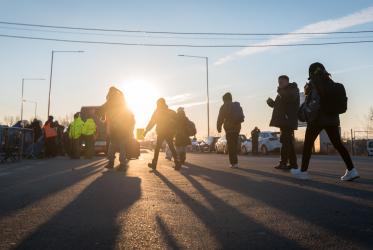Adopted by the Executive Committee, Geneva, 26-29 September 2000.
On 14 December 2000, the Office of the United Nations High Commissioner for Refugees (UNHCR) will commemorate its 50th anniversary. The UNHCR was created as a temporary instrument to respond to the needs of Europeans displaced as a result of World War II. Since then its mandate has not only been renewed every few years, but the scope of its work has expanded enormously. Today it is the primary instrument of the United Nations working with more than 22 million refugees, asylum seekers, returnees, and internally displaced people in 152 countries in all regions of the world.
The churches too have a long history of responding to the needs of uprooted people. Even before the formation of the World Council of Churches, churches were working together to meet the needs of those forced by war and economic circumstances to flee their homes. Working closely with UNHCR since it was created, the churches have provided assistance to uprooted people, facilitated their local integration, repatriation, and resettlement, and have advocated for their protection and for the respect of their human rights. In 1995, the World Council of Churches Central Committee issued a statement urging churches to address the needs of uprooted people in their own communities and in 1997 it adopted a major policy statement and called upon the churches to join in an "Ecumenical Year of Churches in Solidarity with Uprooted People."
Since then, the situation has deteriorated. Governments have devised more sophisticated ways of preventing would-be asylum-seekers and migrants from reaching their borders. Xenophobia, racism and hatred of the stranger are increasing in all regions of the world with increasing displays of hostility and even violence toward foreigners. The international community has yet to respond adequately to meet the needs of those who are displaced by violence but remain within their country's borders. Some governments have gone so far as to suggest that the 1951 Refugee Convention is outdated and needs to be revised to make it even more restrictive. The UNHCR is increasingly subject to contradictory pressures from its member governments and civil society: host governments call for adequate assistance to refugees on their territory; donor governments seek to reduce expenditures and urge repatriation as soon as possible; human rights groups press for more vigorous defense of the rights of uprooted people; and others, especially the churches call for the UNHCR to exercise more energetically the moral authority of its office.
The Executive Committee of the World Council of Churches, meeting in Geneva, 26-29 September 2000, therefore:
Extends its congratulations to the United Nations High Commissioner for Refugees and her staff for the dedicated work they have done for refugees, migrants and internally displaced people over the past fifty years;
Urges the UNHCR to remain a beacon of hope and an uncompromising defender of the rights of those who are forcibly displaced from their communities because of violence, persecution, human rights abuses, and war;
Assures UNHCR of the continuing support of the churches as it works to uphold and to strengthen its mandate to protect asylum-seekers and refugees;
Calls on governments to make available the necessary resources to enable UNHCR to fulfill its mandate and to provide leadership to the international community in this field;
Reaffirms its support for the principles of the 1951 Convention on Refugees and its 1967 protocol as the foundation stone of international refugee law;
Urges governments to adhere to the spirit and the letter of these laws in extending protection to those who are in need of it;
Calls upon the churches to use the occasion of the 50th anniversary of the creation of the UNHCR to raise awareness about the plight of uprooted people in their communities and to seek ways to ensure that their rights and dignity are respected, and their basic needs are met.




